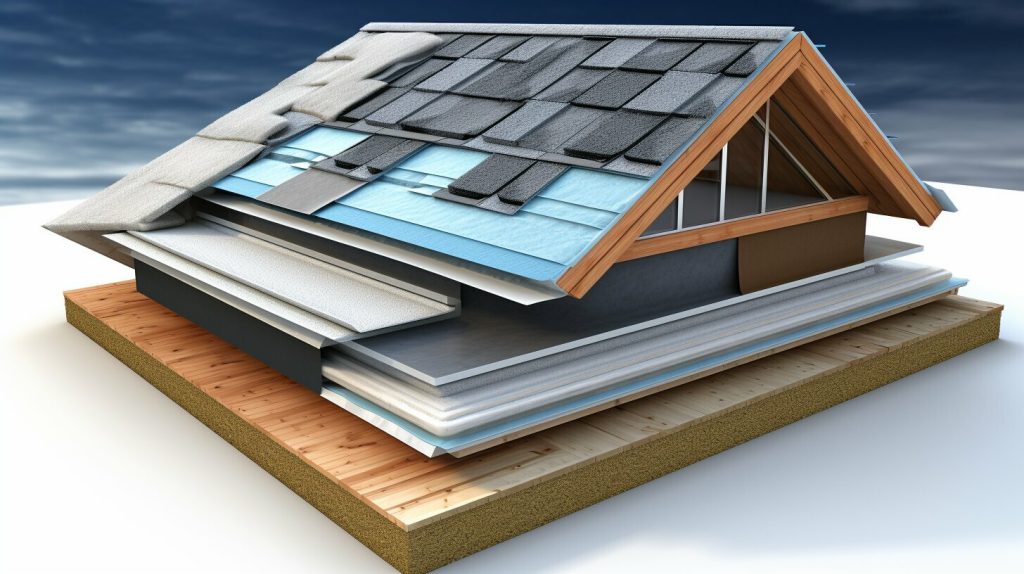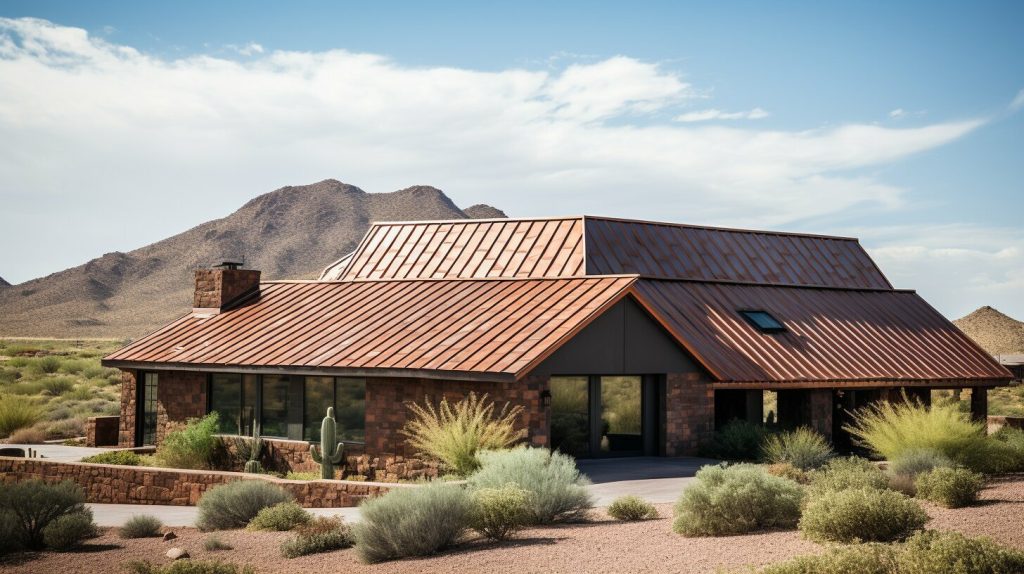Welcome to our guide on spray foam flat roofing! If you are a business owner who is considering spray foam for your flat roof, it is essential to understand the benefits and potential drawbacks of this option.
Spray foam is a popular roofing material made up of a liquid mixture that expands into a foam when applied to a surface. When used on flat roofing, it creates a seamless and durable layer that protects against water damage, provides insulation, and improves energy efficiency.
In this guide, we will discuss the application process of spray foam flat roofing, its advantages and disadvantages, and important considerations for choosing a reliable spray foam flat roofing contractor. With this information, you can make an informed decision that achieves the best outcome for your business.
Key Takeaways:
- Spray foam is a liquid mixture that expands into a foam when applied to flat roofing
- It creates a seamless and durable layer that protects against water damage, provides insulation, and improves energy efficiency
- Choosing a reliable spray foam flat roofing contractor is essential for achieving the best outcome
- It is important to consider both the benefits and potential drawbacks of using spray foam on flat roofing
- Factors such as climate, building structure, and the expertise of the commercial roofing contractor should be considered before making a decision
Understanding Spray Foam Flat Roofing
When it comes to flat roofing, spray foam is a popular choice due to its insulating properties, durability, and ability to provide seamless coverage. Spray foam consists of two main components: polyol resin and isocyanate. These two components are mixed together on-site and applied to the flat roof surface using a specialized spray rig.
The application process involves spraying the material onto the surface of the roof, where it expands and hardens into a closed-cell foam. This foam creates a waterproof and seamless barrier that can last for decades if applied correctly. The result is a durable and energy-efficient flat roof that stands up to harsh weather conditions.
The materials used in the application process are typically safe and non-toxic once cured, but it is essential to ensure proper ventilation during installation. In some cases, additional equipment may be necessary to protect workers from exposure to the chemicals during application.
Benefits of Spray Foam Flat Roofing
Spray foam flat roofing offers several benefits that make it an attractive solution for business owners. Firstly, spray foam provides excellent insulation, which can result in significant cost savings on heating and cooling expenses. This insulation can also help to regulate the temperature inside the building, creating a more comfortable environment for employees and customers.
Furthermore, spray foam is incredibly durable, making it an ideal choice for harsh climates. It can withstand high winds, hail, and heavy rain without sustaining damage, reducing the need for expensive repairs or replacements. The seamless nature of spray foam also helps to prevent leaks and water damage, protecting the building and its contents.
Another significant advantage of spray foam is its energy efficiency. By reducing the need for heating and cooling systems, spray foam can help business owners to reduce their carbon footprint and lower their energy bills. This benefit can have a positive impact on the environment and on the bottom line of the business.
Considerations for Spray Foam Flat Roofing
While spray foam flat roofing offers numerous benefits, there are several things to consider before choosing this option. Business owners should take into account the climate of their area, the building’s structure, and the expertise of their roofing contractor before making a decision.
For example, if a building is located in an area that experiences extreme temperatures or high winds, spray foam may be an excellent option due to its durability and insulation properties. However, if the building has a complex roof structure or existing moisture issues, spray foam may not be the best choice.
It is also crucial to select a reliable and experienced spray foam flat roofing contractor to ensure the best outcome. The contractor should be properly licensed, insured, and have a track record of successful projects. By choosing a reputable contractor, business owners can ensure that their flat roof is installed correctly and will provide long-term benefits for their business.
The Benefits of Spray Foam Flat Roofing
When it comes to selecting the ideal roofing material for your flat commercial roof, there are a variety of options to choose from. However, spray foam flat roofing stands out as an efficient and affordable choice for business owners. Here are some of the benefits of utilizing this type of roofing:
- Excellent Insulation Properties: Spray foam flat roofing can offer up to 50% better insulation than traditional roofing systems, keeping your building comfortable year-round.
- Energy Efficient: With its superior insulation, spray foam flat roofing can help reduce energy costs significantly.
- Waterproofing Capabilities: Spray foam creates a seamless and durable protective layer that can effectively prevent water from penetrating your roof, avoiding costly water damage repairs.
- Long-Term Cost Savings: Spray foam flat roofing can last for up to 30 years with proper maintenance, making it a sound long-term investment for business owners. Moreover, it requires less maintenance than traditional roofing systems, saving you time and money in the long run.
Furthermore, spray foam flat roofing is a versatile material that can accommodate a variety of roof shapes, including those with irregular surfaces or penetrations such as HVAC equipment or skylights. This makes it an ideal choice for business owners who want a customized roofing solution that suits their specific needs.
Overall, spray foam flat roofing can offer a range of benefits to business owners, from its excellent insulation properties to its long-term cost savings. However, it’s important to weigh up the potential drawbacks before deciding to use this type of roofing material on your flat commercial roof.
Potential Drawbacks of Spray Foam Flat Roofing
Although spray foam flat roofing has several benefits, it is crucial to consider the potential drawbacks before making a decision. Here are some of the main disadvantages of using spray foam on flat roofing:
- Initial Installation Costs: The cost of installing spray foam on flat roofing can be higher than traditional roofing materials. However, it is essential to note that spray foam provides exceptional insulation properties and long-term cost savings.
- Maintenance Requirements: Spray foam flat roofing requires regular maintenance to ensure its longevity and effectiveness. This includes cleaning and recoating the foam to prevent any damage that could occur over time.
- Potential for Moisture-Related Issues: If spray foam is not properly applied or maintained, it can lead to moisture-related issues such as leaks and water damage. It is crucial to hire a reputable and experienced spray foam flat roofing contractor to avoid any of these issues.
As with any roofing material, it is important to consider both the benefits and potential drawbacks of using spray foam on flat roofing. By doing so, you can make an informed decision that best suits your business needs and budget.
At our company, we understand the importance of providing our clients with all the necessary information to make informed decisions. That is why we discuss thoroughly the potential drawbacks of spray foam flat roofing to ensure our clients can make an informed decision. We always prioritize quality workmanship and proper installation to minimize any potential problems.
Considerations Before Choosing Spray Foam Flat Roofing
Before opting for spray foam flat roofing, business owners need to keep a few essential considerations in mind to ensure the best outcome for their buildings and budgets.
Climate:
The local climate plays a crucial role in determining whether spray foam on flat roofing is the right choice. Spray foam is ideal for areas with extreme weather conditions because of its excellent insulation properties. It keeps indoor temperatures comfortable year-round, reducing energy bills and making the building more eco-friendly.
Building Structure:
The structure and size of the building determine how well spray foam performs on flat roofing. Spray foam provides a seamless, protective layer that prevents water leaks and promotes energy efficiency. However, larger structures may require additional support systems to handle the weight of the foam, which can increase the initial installation costs.
Expertise of Roofing Contractor:
The expertise of the chosen contractor is critical to the success of spray foam flat roofing. An inexperienced contractor can make mistakes during the application process, leading to costly repairs and maintenance in the future. Therefore, it’s crucial to choose a roofing contractor with relevant experience and a track record of successful spray foam projects.
In conclusion, these considerations can help business owners make informed decisions about spray foam flat roofing and ensure that the properties they invest in are safe, energy-efficient, and cost-effective in the long run.
Choosing a Reliable Spray Foam Flat Roofing Contractor
When deciding to invest in spray foam flat roofing, choosing the right contractor is just as important as the material itself. It is crucial to choose a reliable and experienced contractor to ensure the best outcome for your business.
Firstly, make sure the contractor is licensed and insured. A licensed contractor has the proper training and qualifications necessary to install and maintain spray foam roofing. Insurance protects both you and the contractor in case of accidents or damages during the installation process.
Secondly, check the contractor’s track record. Look for reviews and feedback from previous clients, and ask for references. A reliable contractor should be able to provide you with a list of satisfied clients who can attest to their workmanship and professionalism.
Thirdly, consider the contractor’s experience in installing spray foam roofing. Ask how many similar projects they have completed in the past and inquire about their proficiency in handling flat roofing specifically. A contractor with considerable experience in spray foam flat roofing will be able to foresee and prevent potential issues.
In conclusion, taking the time to choose a reliable spray foam flat roofing contractor is essential for the longevity and functionality of your roofing system. With proper research and consideration of the factors mentioned above, you can rest assured that your business will benefit from the benefits of spray foam roofing for years to come.
Conclusion
In summary, choosing spray foam for flat roofing can offer business owners numerous benefits such as excellent insulation, energy efficiency, and waterproofing capabilities. However, it’s essential to consider potential drawbacks such as initial installation costs and maintenance requirements.
Before making a decision, it’s crucial to take into account factors such as climate, building structure, and expertise of the roofing contractor. By choosing an experienced and reliable spray foam flat roofing contractor, you can ensure quality workmanship and long-term cost savings.
Choose Us for Your Spray Foam Flat Roofing Needs
At our company, we have the expertise and experience necessary to provide you with the best spray foam flat roofing solution for your business needs. Our licensed and insured contractors are equipped with the latest technology and techniques to ensure a seamless and durable protective layer for your flat roof. Contact us today to learn more about our services and how we can help you with your flat roofing needs.
FAQ
What is spray foam flat roofing?
Spray foam flat roofing is a roofing system that involves the application of spray foam insulation material onto a flat roof surface. The foam is sprayed onto the roof in liquid form and expands to create a seamless and durable protective layer.
How is spray foam applied to flat roofing?
Spray foam is applied to flat roofing by using specialized spray equipment. The foam is sprayed onto the roof surface in a controlled manner, allowing it to expand and create a continuous layer. It requires professional knowledge and expertise to ensure proper application.
What are the benefits of spray foam flat roofing?
Spray foam flat roofing offers numerous benefits. It provides excellent insulation properties, helping to keep buildings cooler in the summer and warmer in the winter. It is also energy-efficient, as it minimizes heat loss and reduces energy consumption. Additionally, spray foam provides waterproofing capabilities and can lead to long-term cost savings due to its durability and extended roof lifespan.
What are the potential drawbacks of spray foam flat roofing?
While spray foam flat roofing has many advantages, there are some potential drawbacks to consider. The initial installation cost of spray foam can be higher compared to other roofing materials. Additionally, regular maintenance is essential to ensure its effectiveness and longevity. Improper application or lack of maintenance can result in moisture-related issues such as leaks or mold growth.
What should I consider before choosing spray foam flat roofing?
Before deciding on spray foam flat roofing, consider factors such as the climate in your area, the structure of your building, and the expertise of the roofing contractor. Different climates may require specific considerations for insulation and waterproofing. The structural integrity of your building should also be assessed to ensure it can support the additional weight of the spray foam. Lastly, selecting an experienced and reliable spray foam flat roofing contractor is crucial for a successful installation.
How do I choose a reliable spray foam flat roofing contractor?
When selecting a spray foam flat roofing contractor, it’s essential to choose a reputable and experienced professional. Look for contractors with proper licensing and insurance to ensure they meet industry standards. It’s also beneficial to review their track record of successful projects and read customer reviews or testimonials. Requesting references and obtaining multiple quotes can help you make an informed decision.
What is the summary of spray foam flat roofing pros and cons?
Spray foam flat roofing offers benefits such as excellent insulation, energy efficiency, waterproofing capabilities, and long-term cost savings. However, it comes with potential drawbacks such as higher initial installation costs and a need for regular maintenance. Considering factors like climate, building structure, and choosing a reliable contractor are crucial before deciding on spray foam flat roofing.





